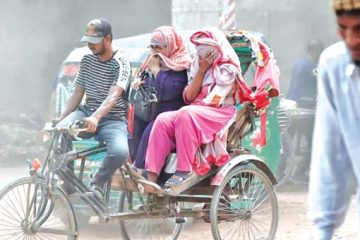Shamsuddin Ahmed
Nepal is undergoing significant changes. Maoists, who came to power through an election last year, have recently adopted a political declaration to turn the country unto a people’s republic in line with China. They have started unification of left parties. Communist (Unity Centre) merged with the Maoist on Tuesday (January 13) and Masal Group was integrated few days ago. Renamed as Unified CPN (Maoist), the party now feels stronger.
Meanwhile, a Chinese team visited Kathmandu this week to discuss construction of a dry port at Larcha on Tibet border, opposite Tatopani in Nepal, at a cost of US$ 12.5 million. It is expected to reduce dependence on import through the Birganj dry port on the southern border. Prime Minister Pushpa Kamal Dahal (Prachanda) addressing a big rally in Kathmandu on January 13, marking the merger of the three parties, was highly critical of the Congress leaders and their alien masters. “People will revolt if his government is forced to quit, and capture power the next day. Nothing in the world can stop us,” declared the fiery Maoist leader and called for forming a world communist front against “imperialist and expansionist forces.'”
This has undoubtedly caused worries to India and USA as well. If Dahal succeeds with his political agenda it is likely to leave an impact on the political scenario of the region.
King Birendra’s murder
But many doubt about its success. Landlocked Nepal is heavily dependent on India on its southern border for external trade. Foreign media reported that King Birendra of Nepal was killed in the palace massacre in June 2001, within a week of a deal with China on construction of roads linking the two countries in a bid to reduce dependence on India.
Knowing this well, Maoist leaders have recently stepped up anti-Indian campaign and ignited the sense of nationalism among the masses. Indian priests who have been heading for ages Kathmandu’s main Hindu temple, Pashupatinath Temple, were forced to resign last week. They have been replaced by Nepali priests. The administration accused that external funds for promoting anti-government movement used to route through the temples headed by Indian priests. The action evoked sharp criticism from Indian leaders and the Hindu zealots demonstrated in front of Nepal Embassy in New Delhi, burnt the effigies of Prime Minister Dahal.
Encircling China
The political declaration of the Unified CPN (Maoist), considered quite significant by observers in the region, has not yet made public. But its main features leaked have been widely published by Nepal and Indian media this week.
It said: “From the nuclear deal with India it is clear that American colonialism is moving ahead, through Indian expansionism, with the intention of increasing its hegemony in South Asia as part of its strategy to encircle China … We are against imperialism and expansionism.”
The Unified CPN declaration further said, “There has been increasing foreign interference in Napal’s political, cultural, economic and social sectors … Nationalism has come under threat and the party has decided to launch a fight against that.”
The Nepalese media quoted senior Maoist leader C.P. Gujarel as saying while talking about the salient features of the declaration. He made oblique but obvious reference to US and Indian envoys’ meetings with Congress leader Koirala and former King Gaynendra beyond diplomatic norms and openly preaching against the Maoists.
Victim of neocolonialism
“By encroaching Susta, Kalapani and Limpiydura as well as other places, India has made Nepal a victim of its neocolonialism,” added Gujarel and branded Nepal Congress Party as ?enemy’ of the country. Congress Party has long ruled the country earning Nepal the name of a ?vassal state of India’.
It is not unlikely that Beijing was behind the Maoists adopting the declaration directed against India and USA. Wang Hong-Wei, an elderly professor of the Institute of Asia-Pacific Studies, Beijing, visited Kathmandu and had meetings with the Maoist leaders in July last year. He told Kantipur News, “China knows very well that India wants to turn Nepal into a second Bhutan or Sikkim. Moreover, Nepal may enter the process of Sikkimisation. But China must not let this situation occur. China will always lend its support to keep Nepal sovereign, free and united.”
Merger of Indian Maoist parties
The concern of New Delhi over the developments in Nepal is understandable. Three major Maoist parties of India that merged late last year may forge unity with the Maoists of Nepal. The unified Maoist Party of India has recently restructured its armed wing, People’s Liberation Guerrilla Army (PLGA), with Ganapati as the commander-in-chief, posing a serious threat to the internal security in India. Unnerved, Home Minister Chidambaram summoned the chief ministers of Maoist-dominated States of Chhatisgarh, Bihar, Jharkhand, Orissa, Andhra, Maharashtra and West Bengal to New Delhi on January 7. The Hindu reported that the chief ministers have been asked to take all out steps to neutralise the PLGA outfit.
Courtesy: weeklyholiday.net







